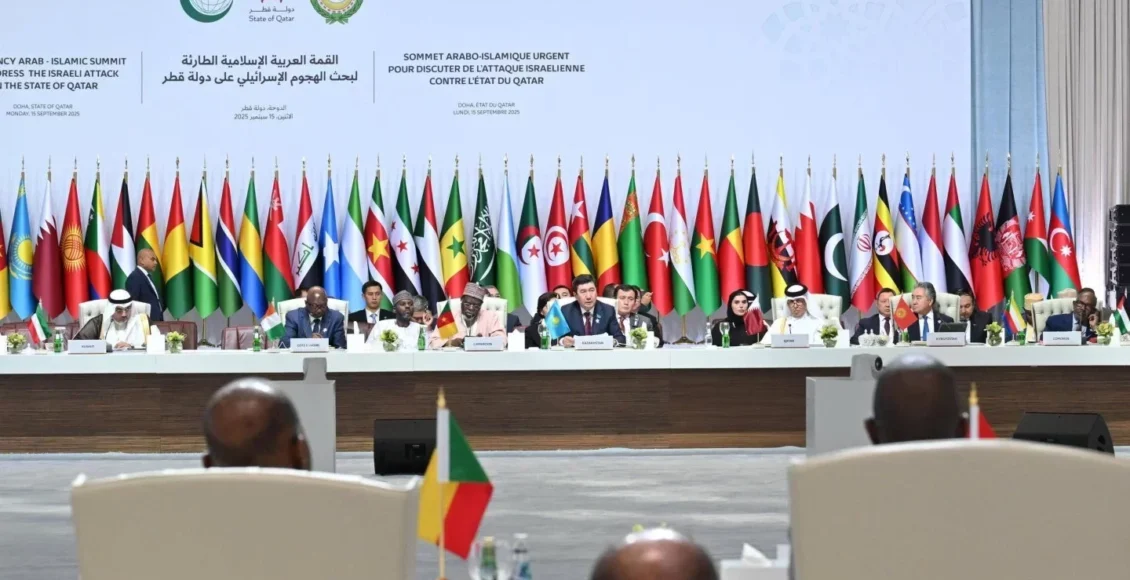Doha – The recent Arab-Islamic Conference held in Doha has once again brought regional security questions into sharp focus, particularly after Israel’s reported strikes on Qatar and allegations about who provided refueling support to Israeli aircraft. The incident has not only raised concerns over sovereignty but also reignited debates about the role of American bases in the Gulf, Arab dependence on U.S. technology, and the potential for independent Muslim defense arrangements.
Background: American Bases in the Gulf
For decades, the United States has maintained a significant military presence in the Gulf. These bases were originally established during the Gulf War of 1991, when Washington positioned itself as the guarantor of security for allied states against regional threats such as Saddam Hussein’s Iraq. Today, Qatar alone hosts the Al Udeid Air Base, one of the largest U.S. facilities outside American territory, housing thousands of troops and critical command-and-control infrastructure.
Critics argue that such facilities, while ostensibly protecting Gulf States, also serve broader U.S. and Israeli strategic interests. The silence of U.S. forces during the Israeli strikes on Qatar has fueled suspicions that the bases are not primarily intended to safeguard Arab nations but to maintain American dominance in the region.
The Israel–Qatar Incident
Reports of Israeli jets striking targets in Qatar have been widely discussed in Arab media. More controversial are claims that refueling support enabled these operations, allowing Israeli fighters to complete long-distance sorties. If true, this would represent not only a direct military threat to Qatar but also a severe breach of trust between Arab partners and Washington.
This incident has deepened a sense of vulnerability among Gulf States. It has also underscored a pressing question: can Arab nations rely on the very powers that maintain military dominance in their territories?
The Doha Conference: Unity in Symbolism
The Arab-Islamic Conference in Doha was convened as a show of solidarity with Qatar. Leaders and representatives from across the Muslim world attended, calling for collective security, economic cooperation, and resistance against external interference.
Statements issued at the conference emphasized that attacks on one Arab state should be treated as attacks on all, echoing the principles of collective defense. Yet observers note that such declarations often fall short of implementation. As Reuters highlighted, past Arab summits have produced strong rhetoric but limited concrete action.
Nevertheless, the symbolism of unity has unsettled both Washington and Tel Aviv, reminding them that the Arab street remains deeply opposed to Israeli military actions and suspicious of American involvement.
U.S. Priorities and Symbolic Gestures
While the Doha conference was underway, U.S. Secretary of State Antony Blinken was visiting Israel, even attending a ceremony at a Devar-e-Girya (mourning wall). The juxtaposition was striking: Arab leaders gathered to denounce aggression, while Washington’s top diplomat stood alongside Israeli officials.
For many analysts, the timing sent a clear message. America’s strategic commitments remain tied to Israel, even at the cost of alienating long-standing Arab partners. This has reinforced doubts about whether Gulf States can rely on Washington when their security is directly at risk.
Economic and Military Dependence
One of the most significant barriers to Arab independence in security affairs is their reliance on the U.S. and Western allies for both economic and military infrastructure. According to the Financial Times, trillions of dollars of Arab sovereign wealth funds are invested in American markets. Militarily, Gulf air forces rely almost entirely on U.S. aircraft such as the F-15, F-16, and F-35, as well as American maintenance and training support.
This dependence limits the freedom of action for Arab states. Any attempt to form an independent defense structure would require not only vast financial resources but also the political will to shift away from American technology.
Historical Precedents: Pakistan and Saudi Arabia
History offers examples of limited security cooperation among Muslim countries. In the 1980s and 1990s, Pakistan stationed troops in Saudi Arabia, assisting in defense and training. This arrangement, though modest in scale, demonstrated that cross-national Islamic defense collaboration is possible.
The question remains whether such cooperation could evolve into something akin to NATO—a binding agreement ensuring collective defense against external threats.
The Idea of an “Islamic NATO”
Calls for an “Islamic NATO” have surfaced repeatedly, especially in times of regional crisis. Proponents argue that Muslim states must take responsibility for their own defense rather than outsourcing it to Washington.
If Muslim states were to unite militarily against Israel, they would almost certainly face U.S. opposition, potentially escalating into a larger conflict. The practical question is whether Arab governments, heavily tied to U.S. assets and systems, would be willing—or able—to endure such costs.
Impact on Washington and Tel Aviv
For the U.S. and Israel, the Doha conference was more symbolic than strategic. Analysts quoted in The Guardian noted that while Arab unity speeches resonate emotionally, they rarely translate into military action. Still, symbolism matters. Arab leaders’ joint stance highlighted growing frustration with America’s one-sided approach to the Israeli-Palestinian conflict.
For Israel, the optics of Arab solidarity may increase diplomatic pressure, but militarily, Tel Aviv continues to rely on its superior capabilities and U.S. backing. For Washington, the conference was a reminder that Arab trust is not unlimited and may erode further if perceived betrayals continue.
Conclusion: Between Dependence and Independence
The Doha conference has revived old questions with fresh urgency. Are Arab states still relying on the “cat to guard the milk”—outsourcing their security to powers whose loyalties lie elsewhere? Or is it finally time to develop independent security arrangements?
For now, the region remains caught in between: dependent on American assets, yet deeply skeptical of American intentions. Whether the idea of an “Islamic NATO” will ever move beyond rhetoric depends on whether Arab states are ready to take the political and economic risks of charting their own course.
Until then, symbolism will continue to play a larger role than substance, and the region’s security will remain vulnerable to the decisions of powers far beyond its borders.



